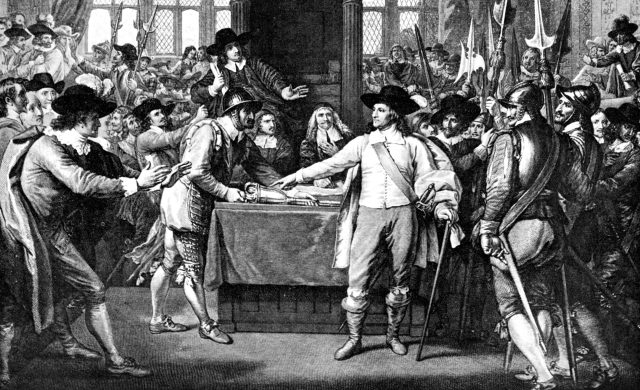The Dismissal of the Rump Parliament by Oliver Cromwell in 1653 (Photo by The Print Collector/Print Collector/Getty Images)

As our politicians head back to Westminster, we asked: what should be on the Cabinet’s reading list? Which books might provide helpful insight for the challenges ahead? James Kirkup recommends the Seeker novels by SG Maclean
SG Maclean is a historian who lives on the Black Isle in Scotland, which isn’t actually an island. She writes very good crime fiction set in Oliver Cromwell’s England, which isn’t just about Cromwell’s England. She wins prizes for her novels, and deserves more fame to go with them. Especially among people in politics.
On the face of it, Maclean’s Seeker novels are about Damian Seeker, a Yorkshire soldier for Cromwell who becomes the leading enforcer for the Protectorate’s domestic intelligence operation. Slowly and subtly over several books, Maclean explores the essential tension here: how can a fundamentally decent man serve a regime he increasingly recognises as falling short of his own high moral standards?
Seeker’s answers are instructive: because he fought for them once, and against another lot who were worse. But that is not enough to sustain — or deserve — lasting loyalty.
It is the theme of loyalty that makes the Seeker novels good reading for politicians, who always need to understand why people support causes — and why they stop.
In the end of the series — so far, at least, for there is hope she will write more — Maclean shows Seeker’s break with the collapsing Cromwell regime not as a grand gesture or an exercise in psychodrama but rather the way real people make big decisions — with a resigned shrug.
Cromwell’s story deserves more attention in the Britain that voted for Brexit. It’s a reminder that, no matter what we tell ourselves about our phlegmatic stability, Britain does indeed do revolutions. Cromwell, of course, was no radical from outside the system. A son of the gentry who sat in Parliament, he led a cause that united disgruntled notables and true grassroots revolutionaries — for instance, the Levellers, who were to be marginalised and bitterly disappointed by Cromwell in power.
Maclean’s hero is part of that non-conformist tradition, a Seeker by faith as well as name, he was part of a small, obscure sect before shifting his faith to Cromwell’s cause and its defence against scheming royalists plotting to restore the dissolute Stuart monarchy.
Such royalists are still a major presence in the England Maclean guides her readers through. Because no revolutionary regime can make its opponents simply disappear — accommodations must be made. The Metaphysical poet Andrew Marvell makes regular appearances as an agent of Seeker’s intelligence operation. Marvell’s precise loyalties were and are unclear: he lionised leading Royalists, but then worked for Thomas Fairfax, the great parliamentary general.
We also meet a young Samuel Pepys, another parliamentarian who converted to Royalism when Cromwell died in 1658.
When that death comes, Seeker is in Bruges tracking the royalist cells that made that city their base while supporting the young Charles Stuart in his designs on the throne amid the shifting backdrop of European politics. This is the setting for the fifth and most recent Seeker novel, The House of Lamentations. It’s a nice way to illustrate the international dimensions of turmoil in British government, as well as a reminder that British leadership worrying about European plots is not a new thing.
The Seeker novels’ lessons for today’s rulers are numerous. Perhaps the biggest is that taking power is easy enough — just win some big battles — but keeping it is much harder. In the end, the stars of the series are the ordinary folk who lent their support to Cromwell and his cause, but then, tired and resigned, welcome back the Stuart monarchy, albeit briefly. It’s a reminder that while elites take politics and government very seriously, the public on whom those things ultimately depend generally don’t pay too much attention, instead just getting on with their lives. Revolutions are easy to declare but hard to sustain.










Join the discussion
Join like minded readers that support our journalism by becoming a paid subscriber
To join the discussion in the comments, become a paid subscriber.
Join like minded readers that support our journalism, read unlimited articles and enjoy other subscriber-only benefits.
Subscribe